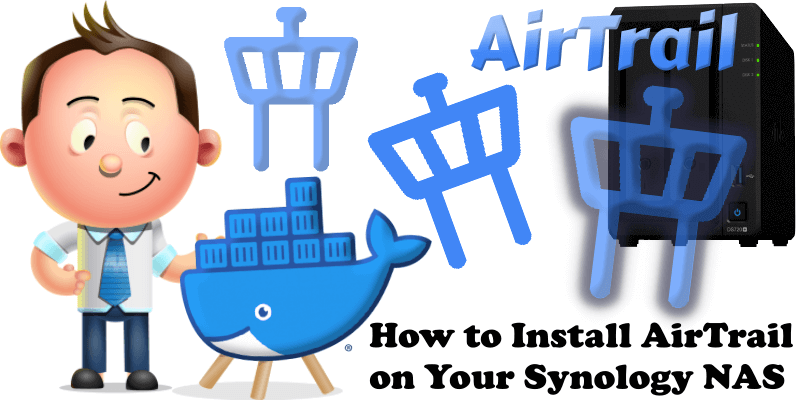
AirTrail is a web application that allows users to track their flights and view their flight history. With AirTrail you can view your flights on an interactive map and keep track of all your flights all in one place. Get insights into your flight history with statistics and import flights from various sources. You can easily import data from MyFlightRadar24. You can use the AirTrail app on any device with a responsive design and switch between light and dark mode. AirTrail allows multiple users and secures your data with user authentication. In this step by step guide I will show you how to install AirTrail on your Synology NAS using Docker & Portainer.
STEP 1
Please Support My work by Making a Donation.
STEP 2
Install Portainer using my step by step guide. If you already have Portainer installed on your Synology NAS, skip this STEP. Attention: Make sure you have installed the latest Portainer version.
STEP 3
Make sure you have a synology.me Wildcard Certificate. Follow my guide to get a Wildcard Certificate. If you already have a synology.me Wildcard certificate, skip this STEP.
STEP 4
Go to Control Panel / Login Portal / Advanced Tab / click Reverse Proxy. Follow the instructions in the image below.
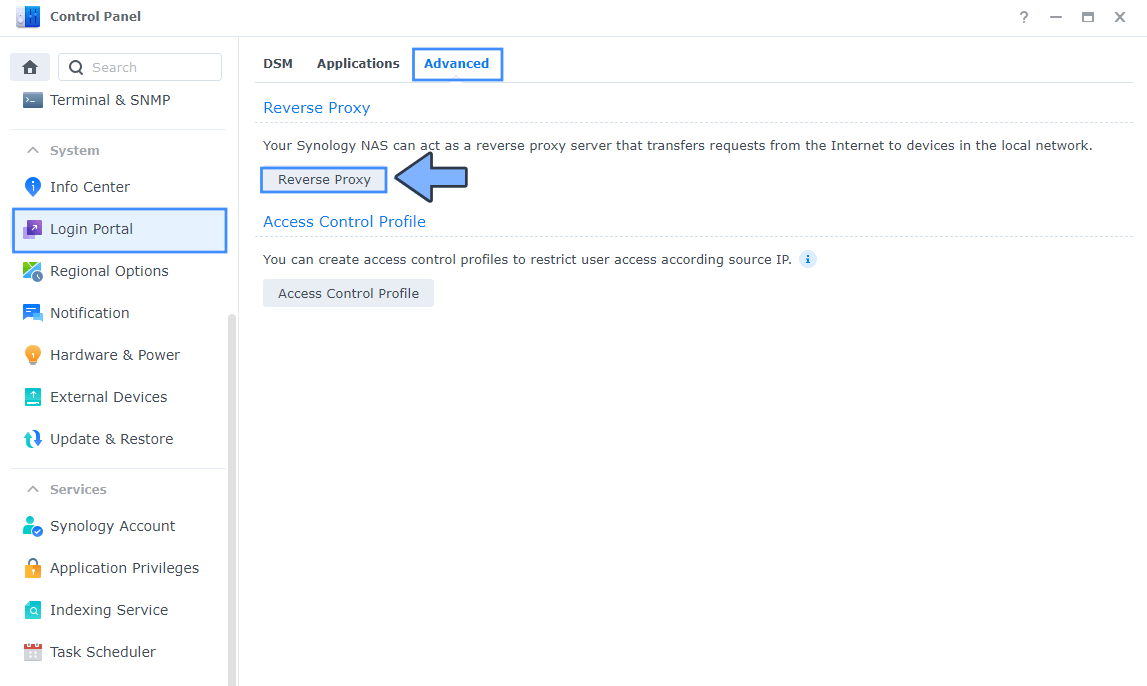
STEP 5
Now click the “Create” button. Follow the instructions in the image below.
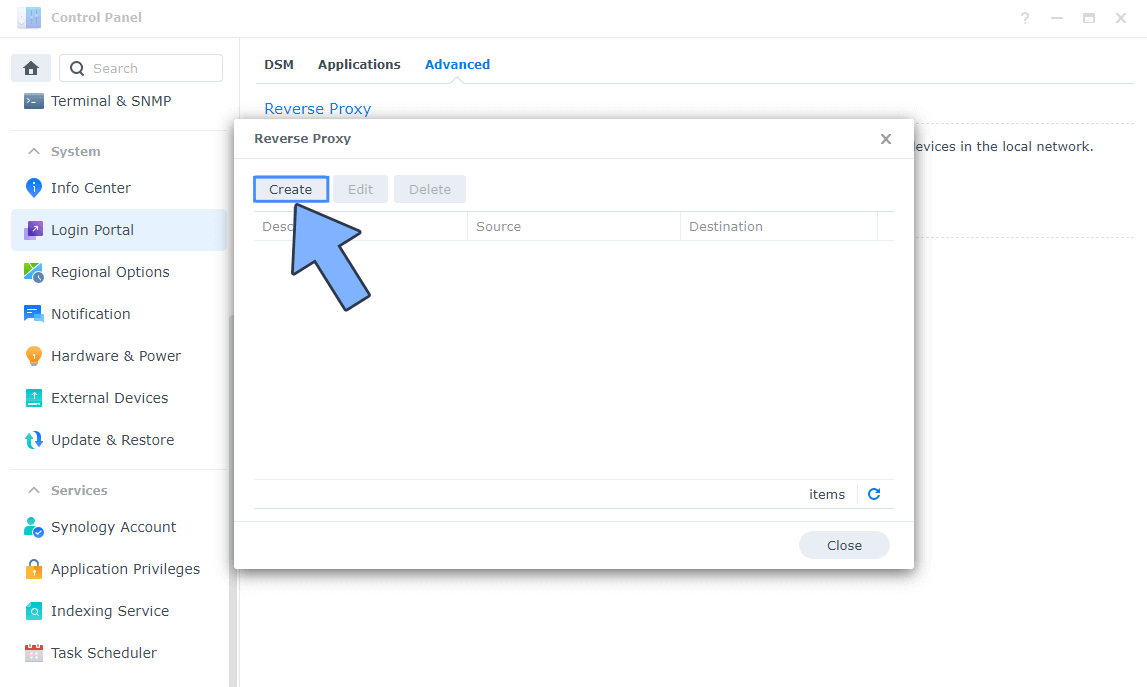
STEP 6
After you click the Create button, the window below will open. Follow the instructions in the image below.
On the General area, set the Reverse Proxy Name description: type in AirTrail. After that, add the following instructions:
Source:
Protocol: HTTPS
Hostname: airtrail.yourname.synology.me
Port: 443
Check Enable HSTS
Destination:
Protocol: HTTP
Hostname: localhost
Port: 3857
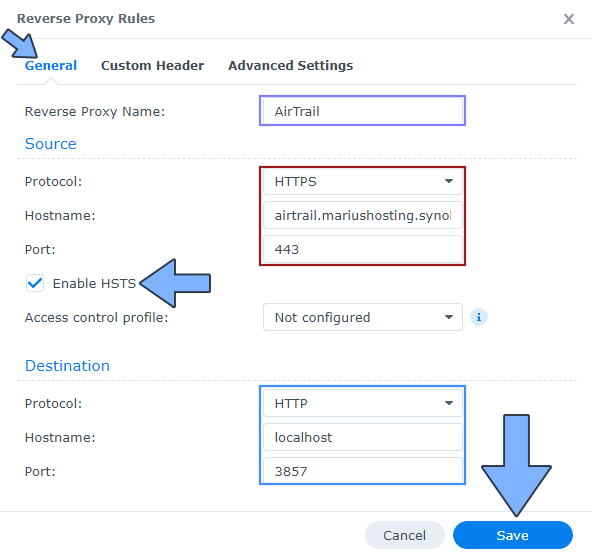
STEP 7
On the Reverse Proxy Rules click the Custom Header tab. Click Create and then, from the drop-down menu, click WebSocket. After you click on WebSocket, two Header Names and two Values will be automatically added. Click Save. Follow the instructions in the image below.

STEP 8
Go to Control Panel / Network / Connectivity tab/ Check Enable HTTP/2 then click Apply. Follow the instructions in the image below.
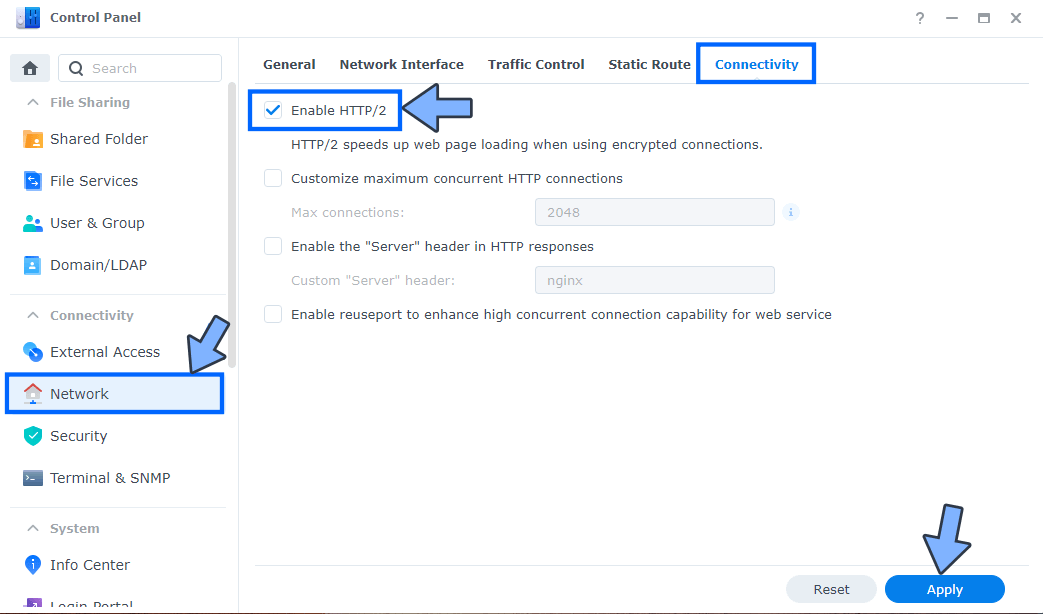
STEP 9
Go to Control Panel / Security / Advanced tab/ Check Enable HTTP Compression then click Apply. Follow the instructions in the image below.
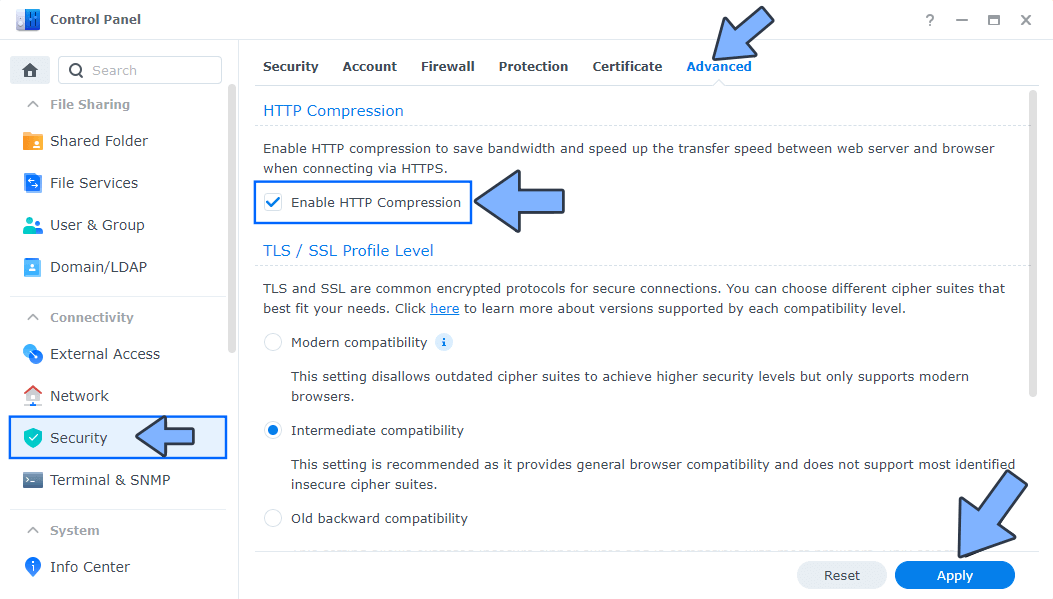
STEP 10
Go to File Station and open the docker folder. Inside the docker folder, create one new folder and name it airtraildb. Follow the instructions in the image below.
Note: Be careful to enter only lowercase, not uppercase letters.
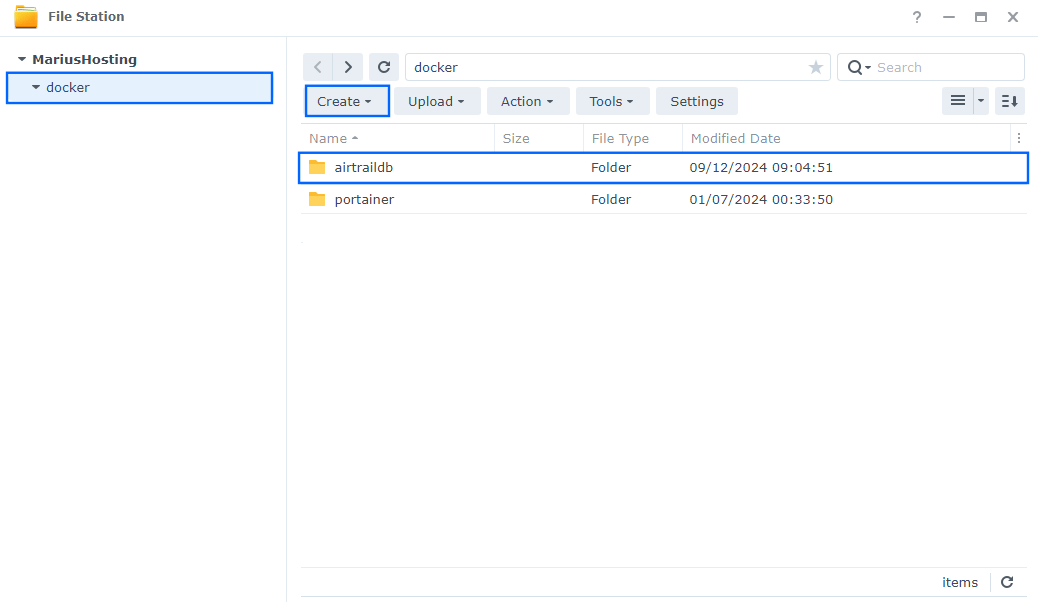
STEP 11
Log into Portainer using your username and password. On the left sidebar in Portainer, click on Stacks then + Add stack. Follow the instructions in the image below.
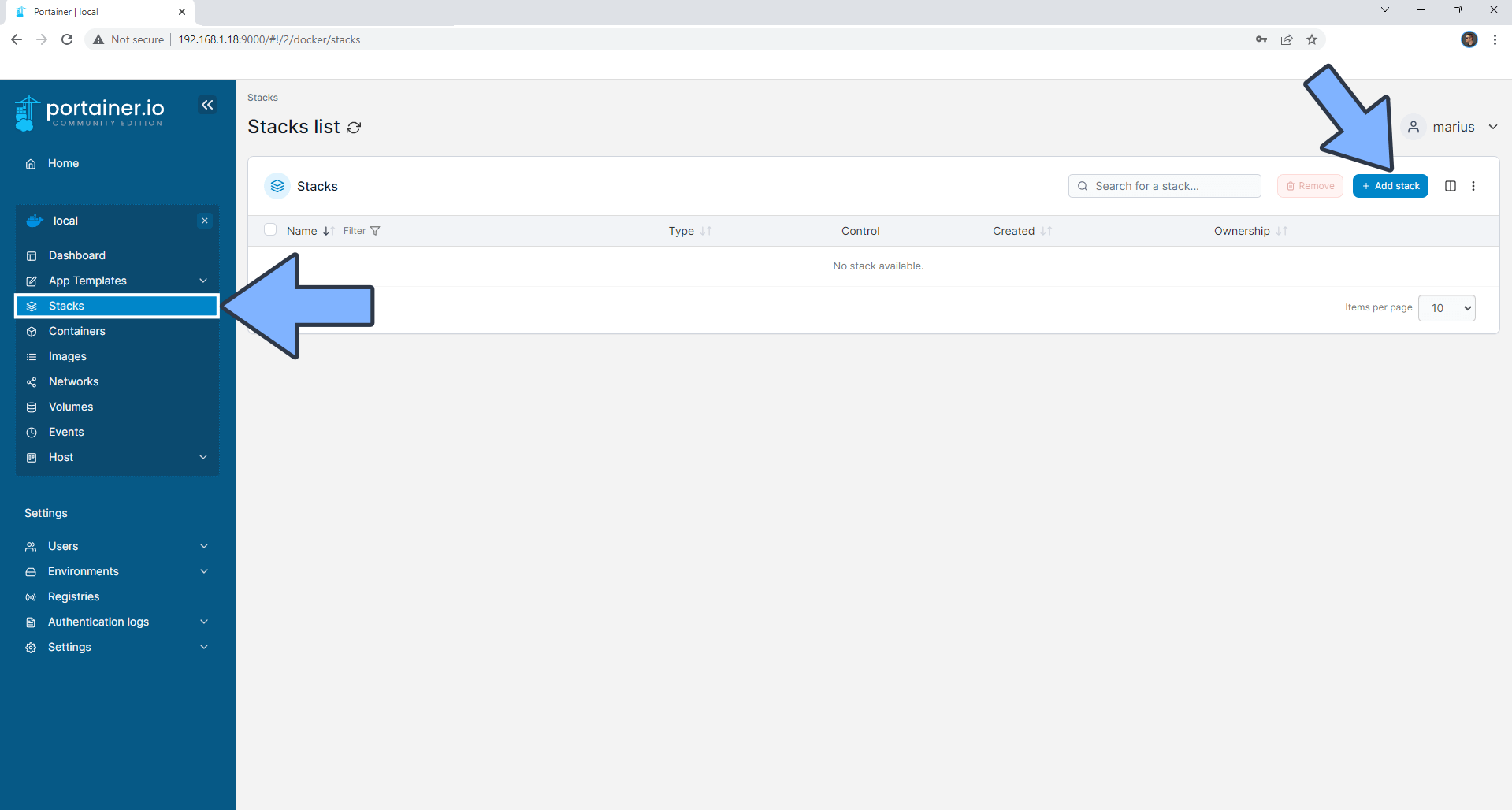
STEP 12
In the Name field type in airtrail. Follow the instructions in the image below.
services:
db:
image: postgres:16
container_name: AirTrail-DB
hostname: airtrail-db
mem_limit: 1g
cpu_shares: 1024
security_opt:
- no-new-privileges:true
healthcheck:
test: ["CMD", "pg_isready", "-q", "-d", "airtrail", "-U", "airtrailuser"]
timeout: 45s
interval: 10s
retries: 10
volumes:
- /volume1/docker/airtraildb:/var/lib/postgresql/data:rw
environment:
POSTGRES_DB: airtrail
POSTGRES_USER: airtrailuser
POSTGRES_PASSWORD: airtrailpass
restart: on-failure:5
airtrail:
image: johly/airtrail:latest
container_name: AirTrail
restart: on-failure:5
healthcheck:
test: timeout 10s bash -c ':> /dev/tcp/127.0.0.1/3000' || exit 1
interval: 10s
timeout: 5s
retries: 3
start_period: 90s
environment:
- ORIGIN=https://airtrail.yourname.synology.me
- DB_URL=postgres://airtrailuser:airtrailpass@db:5432/airtrail
- DB_DATABASE_NAME=airtrail
- DB_USERNAME=airtrailuser
- DB_PASSWORD=airtrailpass
ports:
- 3857:3000
depends_on:
db:
condition: service_healthy
Note: Before you paste the code above in the Web editor area below, change the value for ORIGIN and type in your own synology.me DDNS with https:// at the beginning that you have previously created at STEP 6.
STEP 13
Scroll down on the page until you see a button named Deploy the stack. Click on it. Follow the instructions in the image below. The installation process can take up to a few minutes. It will depend on your Internet speed connection.
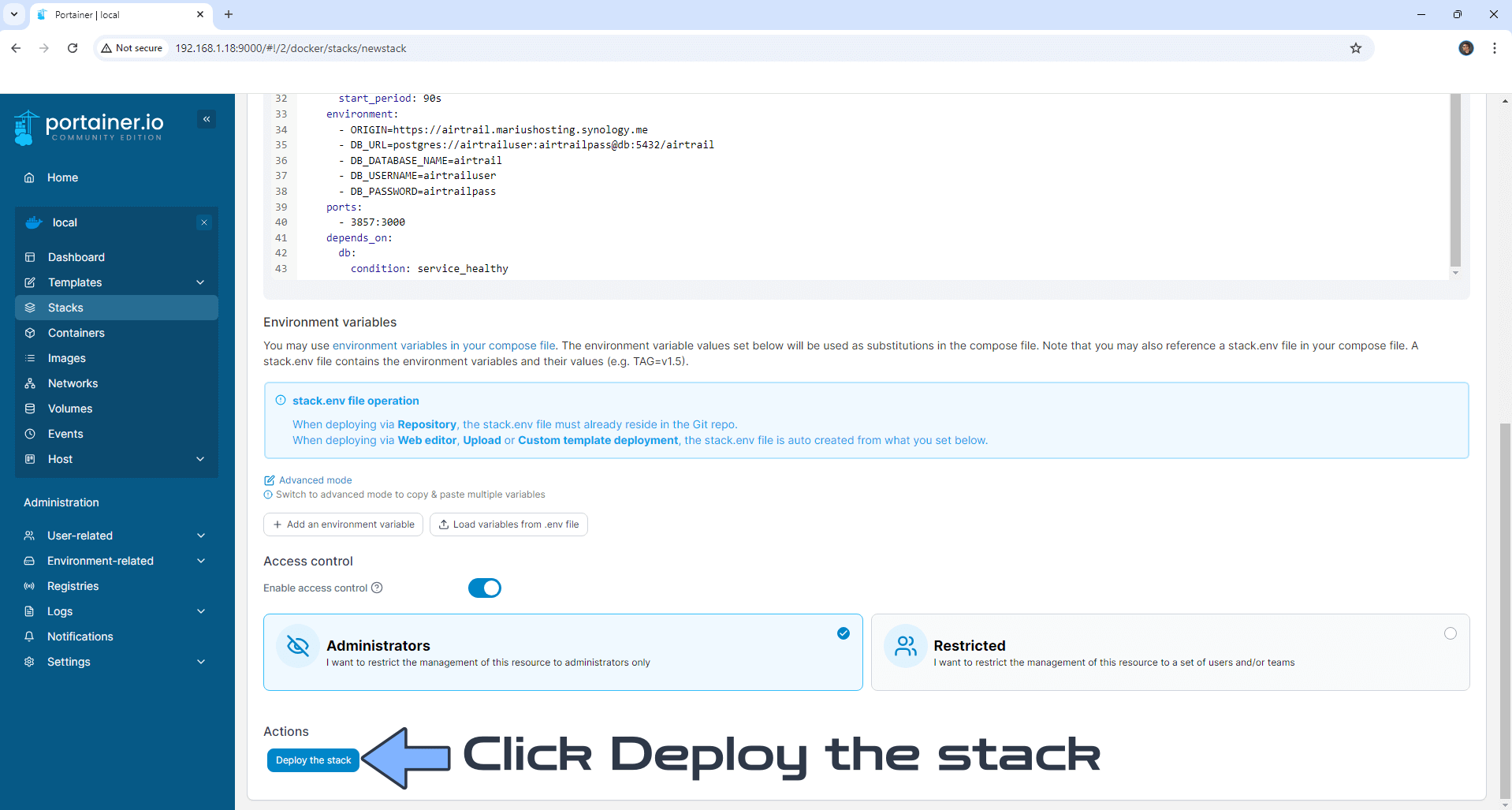
STEP 14
If everything goes right, you will see the following message at the top right of your screen: “Success Stack successfully deployed“.
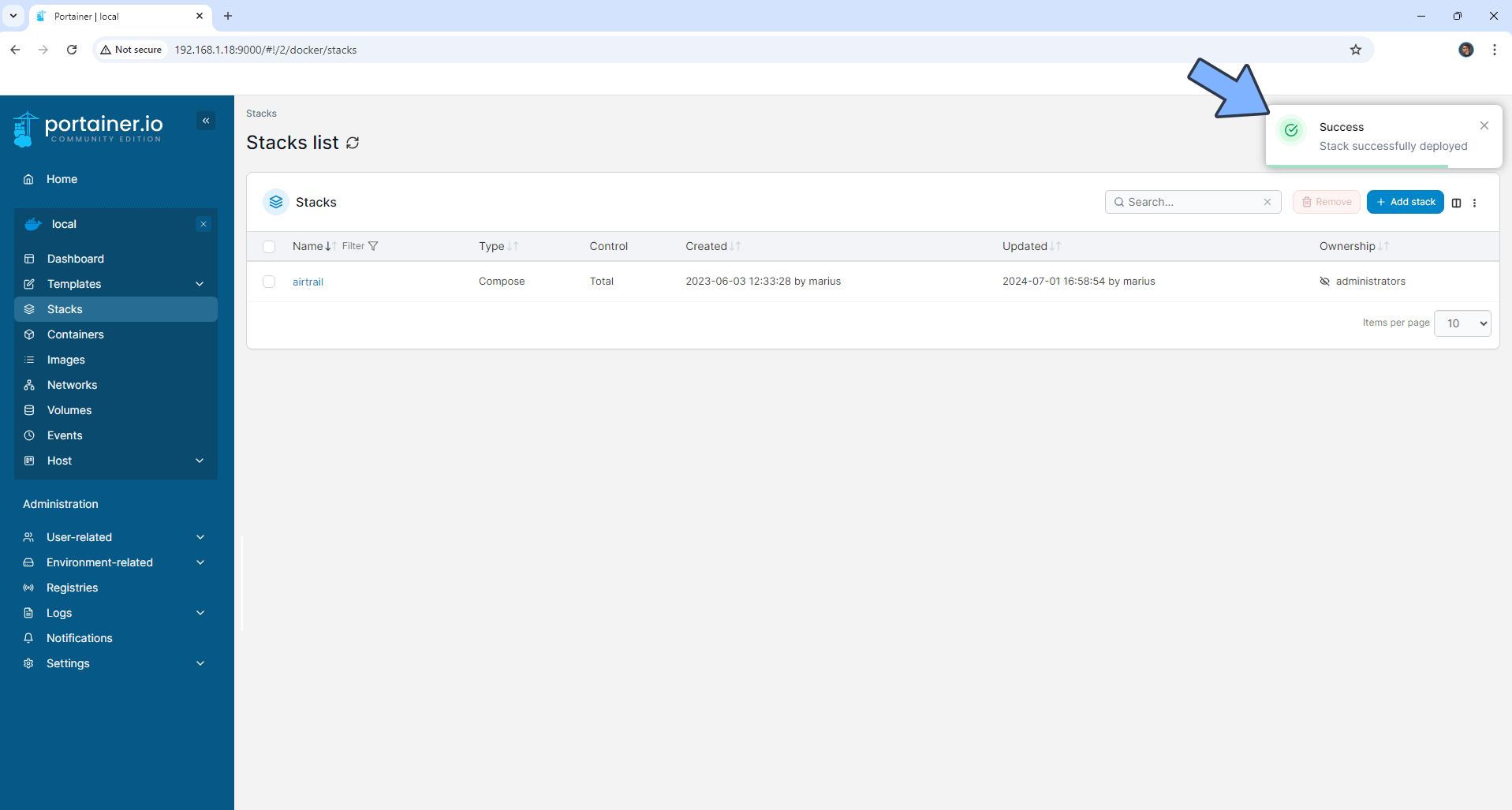
STEP 15
🟢Please Support My work by Making a Donation. Almost 99,9% of the people that install something using my guides forget to support my work, or just ignore STEP 1. I’ve been very honest about this aspect of my work since the beginning: I don’t run any ADS, I don’t require subscriptions, paid or otherwise, I don’t collect IPs, emails, and I don’t have any referral links from Amazon or other merchants. I also don’t have any POP-UPs or COOKIES. I have repeatedly been told over the years how much I have contributed to the community. It’s something I love doing and have been honest about my passion since the beginning. But I also Need The Community to Support me Back to be able to continue doing this work.
STEP 16
Now open your browser and type in your HTTPS/SSL certificate like this https://airtrail.yourname.synology.me that you have previously created at STEP 6. In my case it’s https://airtrail.mariushosting.synology.me If everything goes right, you will see the main AirTrail login page. Add your own details to create your administrator account, then click Create. Follow the instructions in the image below.
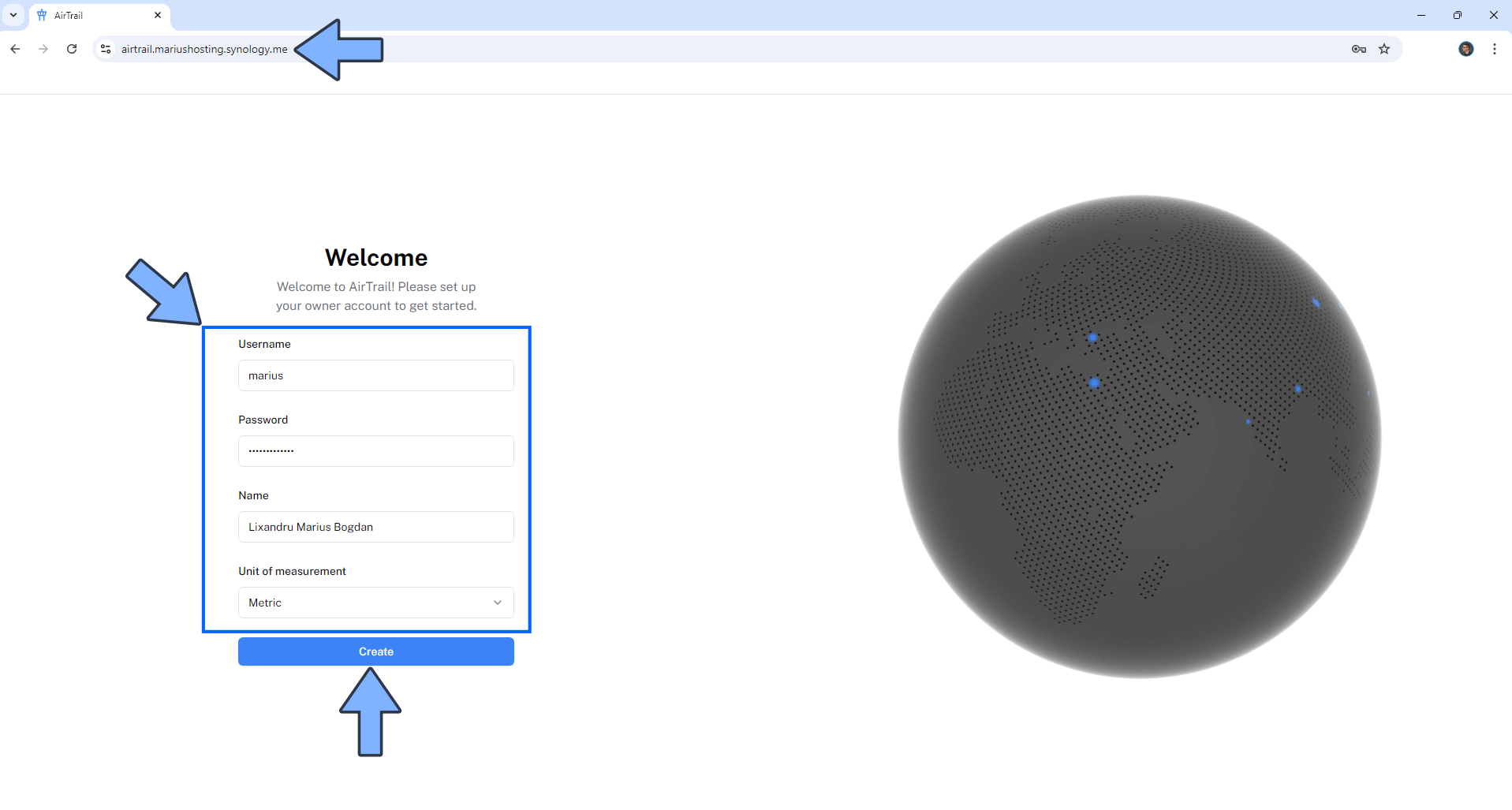
STEP 17
Click the Settings icon at the bottom of the page. Follow the instructions in the image below.
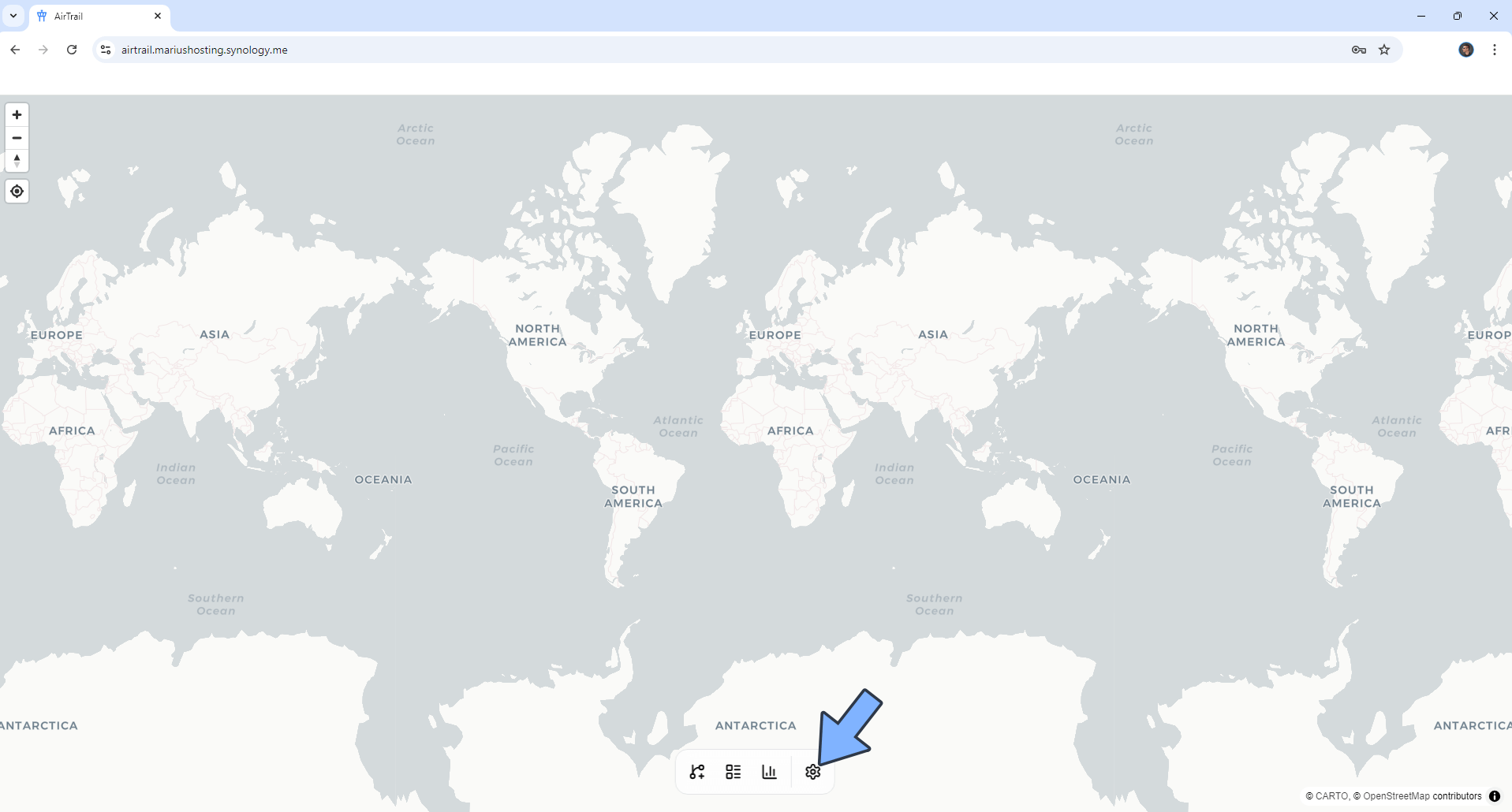
STEP 18
On the left sidebar, click Appearance. You can easily switch the theme to Dark. Follow the instructions in the image below.
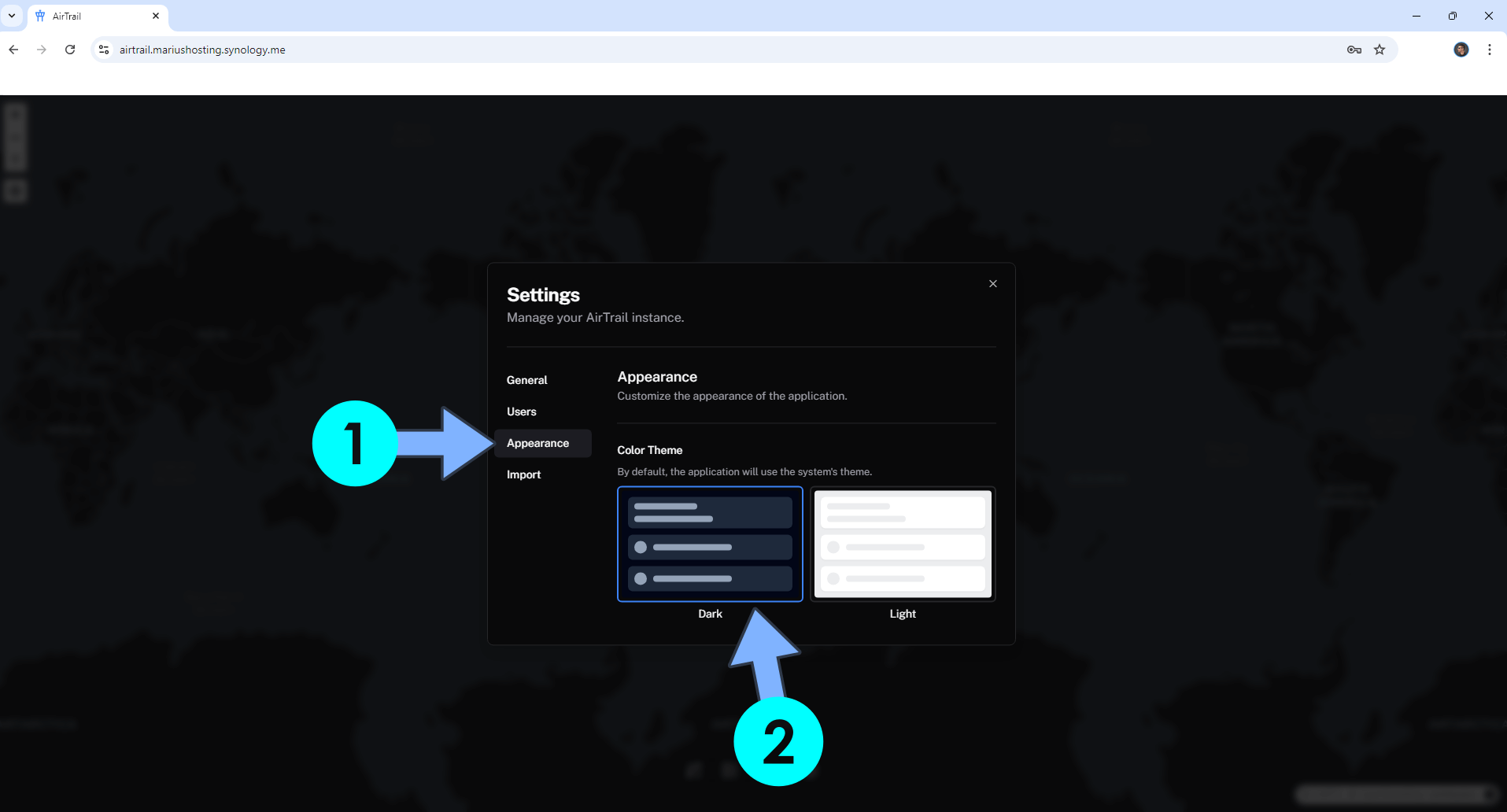
STEP 19
Add your first flight. Follow the instructions in the image below.
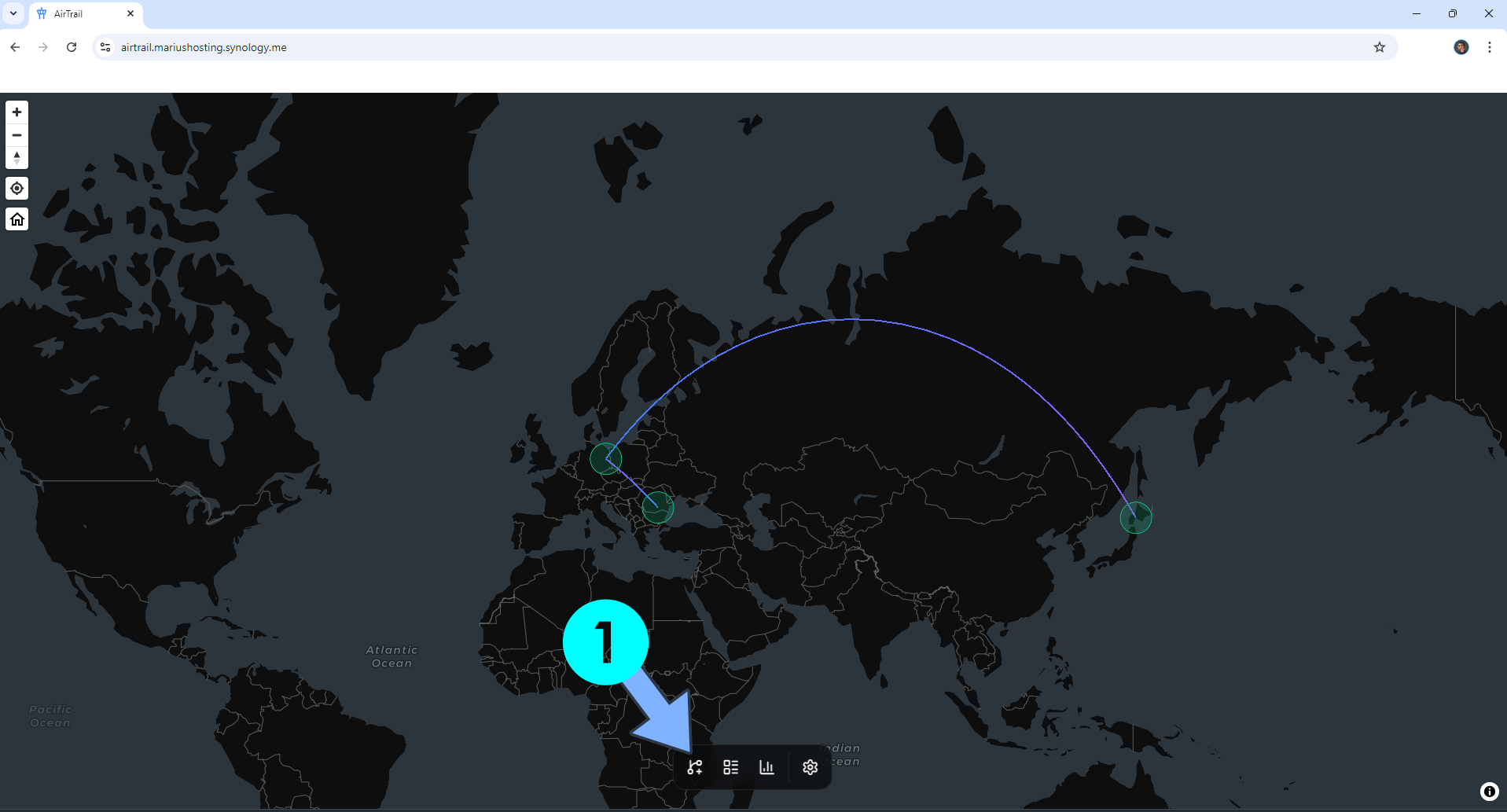
STEP 20
Your AirTrail app at a glance!
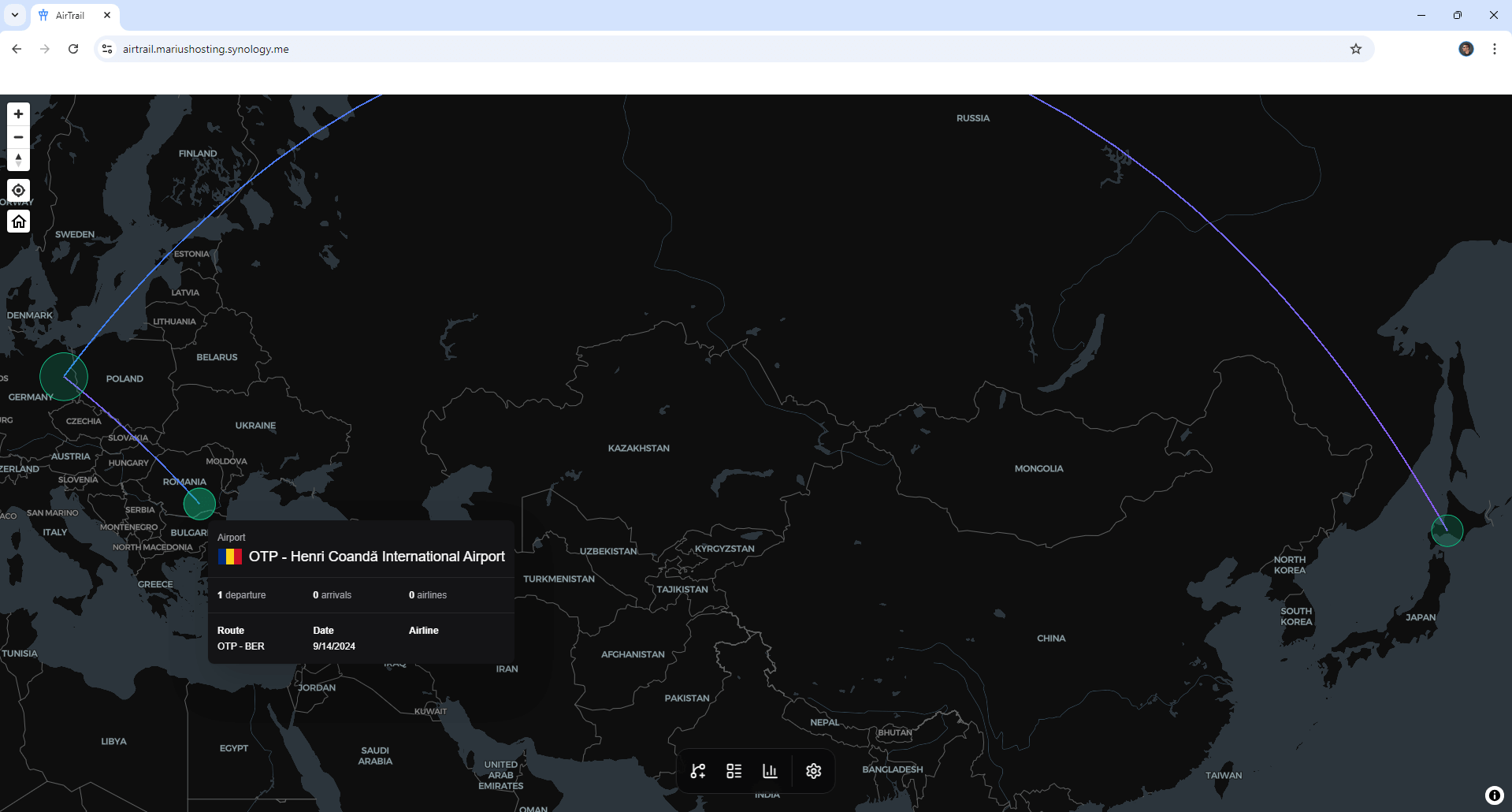
Enjoy AirTrail!
If you encounter issues by using this container, make sure to check out the Common Docker issues article.
Note: Can I run Docker on my Synology NAS? See the supported models.
Note: How to Back Up Docker Containers on your Synology NAS.
Note: Find out how to update the AirTrail container with the latest image.
Note: How to Free Disk Space on Your NAS if You Run Docker.
Note: How to Schedule Start & Stop For Docker Containers.
Note: How to Activate Email Notifications.
Note: How to Add Access Control Profile on Your NAS.
Note: How to Change Docker Containers Restart Policy.
Note: How to Use Docker Containers With VPN.
Note: Convert Docker Run Into Docker Compose.
Note: How to Clean Docker.
Note: How to Clean Docker Automatically.
Note: Best Practices When Using Docker and DDNS.
Note: Some Docker Containers Need WebSocket.
Note: Find out the Best NAS Models For Docker.
Note: Activate Gmail SMTP For Docker Containers.
This post was updated on Wednesday / June 4th, 2025 at 2:33 AM
